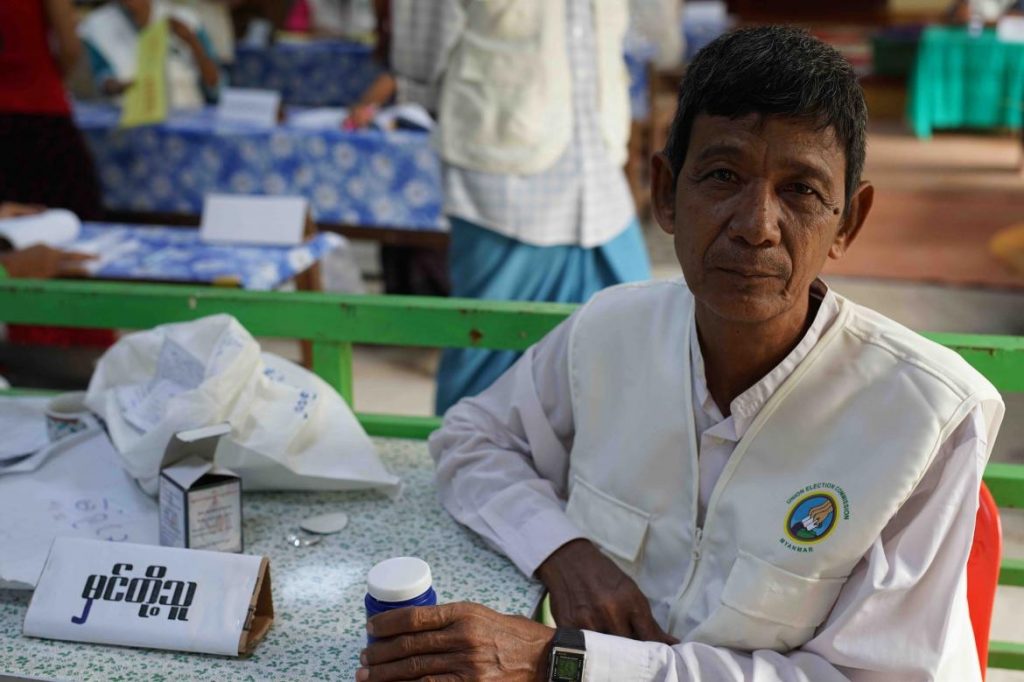The European Union Election Observation Mission has rated Myanmar’s November 8 general election as “credible” at a press conference on its preliminary findings in Yangon this morning, while also pointing out issues with Muslim inclusivity, lack of transparency for out-of-constituency voting, and the undemocratic nature of the guaranteed military block in parliament.
The EUEOM observed 500 polling stations with its team of 150 observers on polling day, many of whom are still in the field to follow the counting and the tabulation process.
“As far as the voting process in the polling stations is concerned, on election day, 95 per cent of the ratings we obtained from observers were very good,” said chief observer Alexander Graf Lambsdorff. “That is a very high number. The vast majority of polling stations opened on time, and officials were well prepared. We have to credit the UEC at all levels for this. They have worked hard to administer the process, although prior to the elections there was a lot of criticism. With this rating, at this stage we can say the election commission did a very good job.”
Voter list issues were front and center in all discussions before the election. The problems turned out to be much smaller than expected, Mr Graf Lambsdorff said. “We found most voters were on the list. Only at 7 per cent of the polling stations were voters not on the list, which is not the same as saying that 7 per cent of the voters were not on the list. It was a good decision to move to a computerized list. There were some problems, but have voter registration issues rendered the election questionable? Very clearly: no.”
Mr Graf Lambsdorff added that he was pleasantly surprised by the fact that at the local level, information was readily shared by officials, and that the EU observers had no problem accessing military installations to observe voting and counting. This was not to say the election was without problems, the chief observer added.
Support more independent journalism like this. Sign up to be a Frontier member.
“Out-of-constituency voting was not transparent,” said Mr Graf Lambsdorff. “It was more like a black box. This pertains to the numbers as well; I don’t have a number of the votes that have been cast in out of constituency voting. Counting is taking place on a township level; we [will] continue to follow that. If such an important part of the process is not transparent, it should be improved in the future.”
The question of inclusivity is another issue, Mr Graf Lambsdorff pointed out. “Verification of candidacies was applied in such a way that a very low number of Muslim candidates remained,” he said.
“Ethnic minorities have been able to field as [many] candidates as they wished. With regards to the Muslims in this country, we should try and find ways to enfranchise them in the future. It is very difficult to understand why they are not able to stand for election or vote. This even concerned sitting members of parliament, which I personally [have] never observed before,” he said.
With regard to the disenfranchisement of the Rohingya, the chief observer said the issue of statelessness is a larger social issue that was reflected in the electoral context. “This is a problem for the whole of Myanmar to address,” he said.
The guaranteed block of 25 per cent of seats in parliament for the military did not sit well with the chief observer. “Internationally it is clear,” Mr Graf Lambsdorff said, “that for a genuine democratic election to take place, one hundred percent of the seats of at least one chamber of parliament should be elected. That of course has not been the case here.”
Mr Graf Lambsdorff ended on the note that the election is not over yet. “As long as the counting is going on and there is no final result, the election is not over. The voting is over, but the EUEOM mission will remain here until the second of December, to observe the counting, the complaint mechanism and conflict resolution.”



